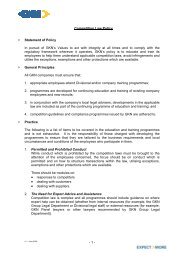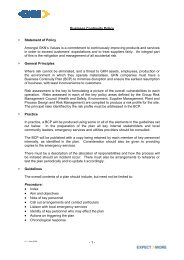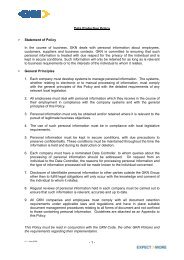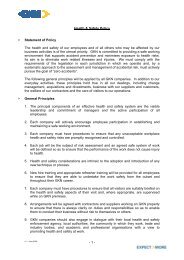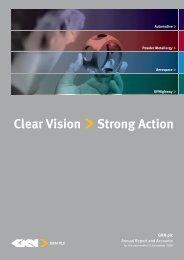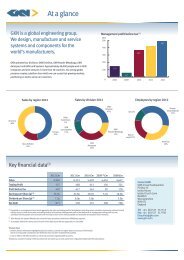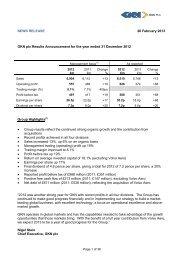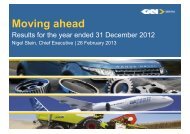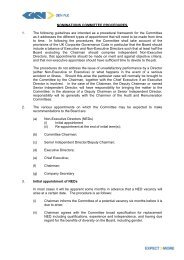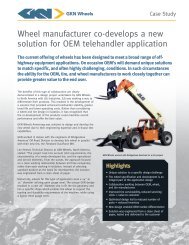Annual Report 2008 in PDF - GKN
Annual Report 2008 in PDF - GKN
Annual Report 2008 in PDF - GKN
Create successful ePaper yourself
Turn your PDF publications into a flip-book with our unique Google optimized e-Paper software.
62<br />
Directors’ Remuneration <strong>Report</strong><br />
cont<strong>in</strong>ued<br />
Basic salary and benefits <strong>in</strong> k<strong>in</strong>d<br />
The basic salary of executive Directors is based on a number of factors<br />
<strong>in</strong>clud<strong>in</strong>g market rates together with the <strong>in</strong>dividual’s experience,<br />
responsibilities and performance. The Remuneration Committee’s<br />
objective is to ma<strong>in</strong>ta<strong>in</strong> salaries at around the median level of the<br />
relevant employment market and it reviews annually benchmark data<br />
provided to it by external consultants. The Committee has reviewed<br />
the performance of the Directors and believes payment of salaries <strong>in</strong><br />
accordance with this policy to be entirely justified.<br />
Individual salaries of executive Directors are reviewed annually<br />
by the Committee, tak<strong>in</strong>g <strong>in</strong>to account circumstances prevail<strong>in</strong>g at<br />
the time <strong>in</strong>clud<strong>in</strong>g the level of Group profitability and prevail<strong>in</strong>g<br />
market conditions, with any <strong>in</strong>crease usually be<strong>in</strong>g effective from<br />
1 July. Follow<strong>in</strong>g the most recent review, the basic salaries payable <strong>in</strong><br />
respect of executive Directors as at 31 December <strong>2008</strong> were: Sir Kev<strong>in</strong><br />
Smith £747,579; Marcus Bryson £375,000; Andrew Reynolds Smith<br />
£400,000; William C Seeger £400,000; Nigel Ste<strong>in</strong> £487,500. Sir Kev<strong>in</strong><br />
Smith’s salary rema<strong>in</strong>ed unchanged from the 2007 level follow<strong>in</strong>g<br />
his decision not to take an <strong>in</strong>crease <strong>in</strong> <strong>2008</strong>. In the light of prevail<strong>in</strong>g<br />
conditions <strong>in</strong> the Group’s markets and their likely impact on Group<br />
profitability, Sir Kev<strong>in</strong> Smith and Nigel Ste<strong>in</strong> have elected to waive 20%<br />
of their basic salary entitlement for the year commenc<strong>in</strong>g 1 January<br />
2009. Andrew Reynolds Smith has elected to waive 15% of his basic<br />
salary entitlement for the same period. The average basic salary of<br />
those executives <strong>in</strong> the most senior executive grade below Board level<br />
whose remuneration is monitored by the Remuneration Committee was<br />
£244,639 as at 31 December <strong>2008</strong> (all non-sterl<strong>in</strong>g amounts have been<br />
translated <strong>in</strong>to sterl<strong>in</strong>g at the year end exchange rate for this purpose).<br />
Benefits <strong>in</strong> k<strong>in</strong>d comprise pr<strong>in</strong>cipally car and healthcare benefits. The<br />
level of benefits provided to executive Directors is consistent with that<br />
provided by other major companies. These benefits do not form part<br />
of pensionable earn<strong>in</strong>gs. In addition, under the terms of William C<br />
Seeger’s service agreement, under which he was required dur<strong>in</strong>g <strong>2008</strong><br />
to relocate to the UK, he received reimbursement of temporary liv<strong>in</strong>g<br />
costs and was entitled to reasonable relocation expenses. Due to the<br />
complicated <strong>in</strong>teraction between the UK and the US tax regimes, tax<br />
and social security equalisation is applied to Mr Seeger’s remuneration.<br />
Additional taxes which arise <strong>in</strong> excess of the monthly contribution<br />
deducted from Mr Seeger are settled by the Company <strong>in</strong> order to ensure<br />
Mr Seeger is not disadvantaged by his global tax position.<br />
Performance-related short term variable remuneration<br />
Payments may be made annually to reward the achievement of<br />
short term operational targets relevant to <strong>GKN</strong>’s long term strategic<br />
objectives. These targets will typically relate to a comb<strong>in</strong>ation of<br />
corporate and, where appropriate, <strong>in</strong>dividual portfolio profit and cash<br />
flow performance and performance aga<strong>in</strong>st strategic plan. In <strong>2008</strong>,<br />
there was an additional target relat<strong>in</strong>g to Lean Enterprise deployment<br />
(except for the Chief Executive) and an <strong>in</strong>creased cash target.<br />
Achievement of on target profit performance and the achievement of all<br />
other objectives would result <strong>in</strong> payments of approximately 78% of an<br />
executive Director’s salary (approximately 76% for the Chief Executive)<br />
and payments are normally capped at around 110% of salary.<br />
The Remuneration Committee has discretion to alter targets to reflect<br />
changed circumstances such as material changes <strong>in</strong> account<strong>in</strong>g<br />
standards or changes <strong>in</strong> the structure of the Group. It may also<br />
make discretionary payments <strong>in</strong> respect of exceptional performance.<br />
Payments to Directors are based upon a percentage of basic salary<br />
received dur<strong>in</strong>g the year and do not form part of pensionable earn<strong>in</strong>gs.<br />
Long term <strong>in</strong>centive arrangements<br />
The Remuneration Committee believes that performance-related long<br />
term <strong>in</strong>centives which closely align executive rewards with shareholders’<br />
<strong>GKN</strong> plc <strong>Annual</strong> <strong>Report</strong> <strong>2008</strong><br />
<strong>in</strong>terests are an important component of overall executive remuneration<br />
arrangements. The structure of the Company’s performance-related<br />
long term <strong>in</strong>centives is considered annually as part of the award process<br />
and <strong>in</strong> <strong>2008</strong> amendments were made to elements of <strong>GKN</strong>’s current long<br />
term <strong>in</strong>centive arrangements for executive Directors and other senior<br />
executives — the <strong>GKN</strong> Long Term Incentive Plan and the <strong>GKN</strong> Executive<br />
Share Option Scheme (described below).<br />
Award levels under each of the <strong>GKN</strong> Long Term Incentive Plan and the<br />
<strong>GKN</strong> Executive Share Option Scheme are set such that the comb<strong>in</strong>ed<br />
rewards available to an <strong>in</strong>dividual Director, assum<strong>in</strong>g full vest<strong>in</strong>g,<br />
are no greater than they would have been had the Group’s long term<br />
<strong>in</strong>centive arrangements comprised only a s<strong>in</strong>gle element. The comb<strong>in</strong>ed<br />
maximum potential annual award under both elements of the long term<br />
<strong>in</strong>centive arrangements is 250% of basic salary, or such higher overall<br />
percentage which may be applied where necessary specifically to<br />
recruit or reta<strong>in</strong> an <strong>in</strong>dividual.<br />
There are no provisions under the rules of either the <strong>GKN</strong> Long Term<br />
Incentive Plan or the <strong>GKN</strong> Executive Share Option Scheme for the<br />
automatic release of unvested awards on a change of control of <strong>GKN</strong> plc.<br />
<strong>GKN</strong> Long Term Incentive Plan (LTIP)<br />
In summary, each executive Director may be awarded annually a right<br />
to receive <strong>GKN</strong> plc ord<strong>in</strong>ary shares (<strong>GKN</strong> shares) up to a maximum<br />
value of 150% of basic salary. The value of shares for this purpose is<br />
calculated by reference to the average of the daily clos<strong>in</strong>g prices of <strong>GKN</strong><br />
shares dur<strong>in</strong>g the preced<strong>in</strong>g year. As stated on page 61, no LTIP awards<br />
were made <strong>in</strong> <strong>2008</strong>.<br />
The number of shares that the Director will ultimately receive will<br />
depend on the Group’s performance dur<strong>in</strong>g the three years commenc<strong>in</strong>g<br />
on 1 January <strong>in</strong> the year of award and on satisfaction of a personal<br />
sharehold<strong>in</strong>g requirement (see page 66).<br />
Follow<strong>in</strong>g shareholder approval at the <strong>2008</strong> <strong>Annual</strong> General Meet<strong>in</strong>g,<br />
a new performance condition was <strong>in</strong>troduced, replac<strong>in</strong>g relative total<br />
shareholder return (TSR). (The new performance condition, which<br />
applies to any awards granted after the <strong>2008</strong> AGM, is based on<br />
compound annual growth <strong>in</strong> earn<strong>in</strong>gs per share (normalised for tax,<br />
exceptional items and volatile IFRS charges or credits) (EPS).) The<br />
maximum potential annual award when comb<strong>in</strong>ed with awards under<br />
the <strong>GKN</strong> Executive Share Option Scheme (ESOS) (described below)<br />
rema<strong>in</strong>s limited to 250% of total face value of salary. Vest<strong>in</strong>g occurs<br />
at a threshold of 6% compound annual EPS growth, at which level<br />
30% of the award vests, and cont<strong>in</strong>ues on a straight l<strong>in</strong>e basis to 12%<br />
compound annual EPS growth at which po<strong>in</strong>t 100% of the award vests.<br />
There is no provision for the retest<strong>in</strong>g of awards under the LTIP.<br />
The Committee considers that an EPS performance condition provides<br />
a true measure of the underly<strong>in</strong>g profitability of a company, reflect<strong>in</strong>g<br />
more directly management effort and performance, and is a prime<br />
factor that <strong>in</strong>vestors take <strong>in</strong>to account when assess<strong>in</strong>g their <strong>in</strong>vestment<br />
decisions; compound annual growth <strong>in</strong> EPS of between 6% and 12%<br />
is a stretch<strong>in</strong>g target of relevance to shareholders. When coupled with<br />
the TSR-based performance condition under the ESOS, the Committee<br />
believes that the <strong>in</strong>centives available provide a mean<strong>in</strong>gful <strong>in</strong>centive<br />
package for the motivation and retention of executive Directors which is<br />
l<strong>in</strong>ked directly to shareholders’ <strong>in</strong>terests.<br />
For awards made between 2004 and 2007, the comparator group<br />
comprises a tailored peer group represent<strong>in</strong>g <strong>GKN</strong>’s major competitors<br />
and customers worldwide. (Where a comparator company’s shares are<br />
listed on an overseas market, the TSR of that company is calculated <strong>in</strong><br />
local currency. The Committee believes this method of measurement<br />
provides a true <strong>in</strong>dication of a company’s performance, without<br />
potential distortions brought about by w<strong>in</strong>dfall movements <strong>in</strong> currency.)



